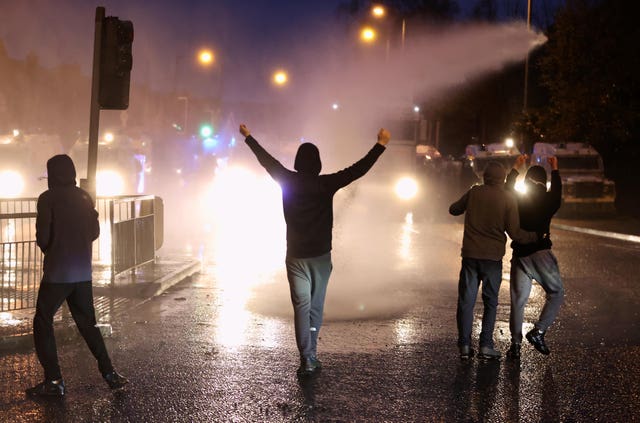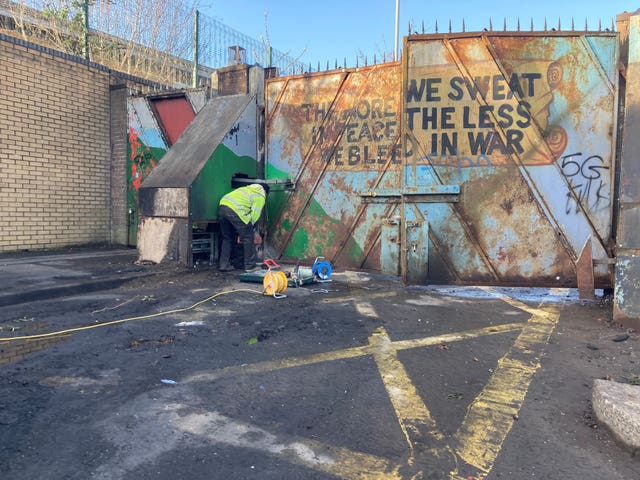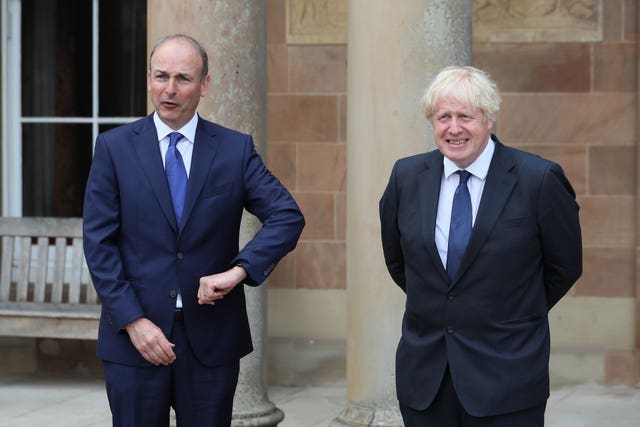PSNI rules out involvement of loyalist paramilitaries in orchestrating violence
Assistant Chief Constable Jonathan Roberts said he does not believe the recent disorder was ‘sanctioned and organised by prescribed organisations’.

The PSNI has ruled out the involvement of loyalist paramilitary groups in orchestrating the violence seen in Northern Ireland in recent days.
It follows a statement from the Loyalist Communities Council (LCC), an umbrella group representing the UVF, UDA and Red Hand Commando, that none of its groups were involved in rioting “either directly or indirectly”.
On Thursday Northern Ireland Assistant Chief Constable Jonathan Roberts said it was “clear there was a degree of organisation” to the violence.
However, Mr Roberts appeared to backtrack on that position on Friday when asked about the LCC statement.
He said: “It’s our overall assessment that the violence that has taken place over the last few nights is not orchestrated by a group, in the name of that group.
“There are certainly people who have been engaged in violence who are nothing to do with any illegal organisation.
“There are young people who have gotten involved and for whatever reason that they’ve decided to do so.
“We feel that there may be some people who could have connection to proscribed organisations, who have been present on the scenes of violence.
“But we don’t believe it’s been sanctioned and organised by prescribed organisations for peaceful protests.”
It comes after another night of disorder in west Belfast in which a further 19 police officers were injured, along with a police dog.
He said: “I would appeal to those who wish to engage in such activity not to.
“It serves no purpose.
“The police will continue to investigate those who engage in disorder and commit serious offences.
“Last night a further vehicle was hijacked.
“People can expect if they are convicted of such crimes to receive custodial sentences.
“It will change people’s lives forever.”

Deputy First Minister Michelle O’Neill said she was “worried about the weekend ahead” amid ongoing violence on the streets of Northern Ireland.
The Sinn Fein vice president said: “As for the last number of days and the violence we have seen on our streets, that has to be condemned by all quarters.
“I welcome the fact that there is a unity of purpose across all political leaders to say that this is wrong and it needs to stop.
“I’m worried about the weekend ahead. We all need to be very careful and very consciously try to do all we can to prevent this happening.
“I hope and I urge all young people to not engage, do not allow yourself to be used or manipulated in any sort of way, and to stay off the streets, stay home and stay safe.
“We met this morning with the Chief Constable and the Secretary of State, and all the parties were represented. I think it’s really important to engage.
“I think there’s a strong role here for the two governments, as co-guarantors of the Good Friday Agreement. I made that point to Brandon Lewis this morning.
“It’s really, really important that we stand shoulder to shoulder and say no to this type of criminal behaviour, and that we don’t allow our children to be sucked in by criminal gangs who are orchestrating some of what we see on our streets.”

A water cannon was used by police in Northern Ireland for the first time in six years to quell crowds gathered on a nationalist section of the Springfield Road.
A human chain of community workers was formed to prevent rioters reaching the gates at the peace wall at Lanark Way, the scene of Wednesday night’s tensions.
In total, 74 police officers have been injured in more than a week of violence.

He described the range of injuries as generally minor to limbs and bodies, and damage to hearing.
Mr Roberts said measures such as AEPs, a type of plastic bullet, and a water cannon were deployed over recent nights when police had exhausted other tactics.
Prime Minister Boris Johnson, Irish premier Micheal Martin and US President Joe Biden have called for a calming of tensions.

The violence is unfolding at a time of increasing rancour in the political sphere amid tensions over the post-Brexit Irish Sea trade border and the fallout from the police’s handling of the mass republican funeral that took place during pandemic restrictions last year.
Unionists are furious at a decision by prosecutors not to take action against 24 Sinn Fein politicians, including deputy First Minister Michelle O’Neill, for attending the funeral of former IRA leader Bobby Storey, a decision partly related to the fact that police had engaged with organisers before the event that drew 2,000 people on to the streets.
Drugs seizures against a dissident faction of the UDA in south-east Antrim have also been blamed.





